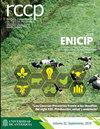Reducing Salmonella enterica serovar Enteritidis contamination in food: lytic bacteriophages in a homemade mayonnaise-like matrix
IF 0.5
4区 农林科学
Q4 AGRICULTURE, DAIRY & ANIMAL SCIENCE
引用次数: 0
Abstract
Background: Salmonella enterica serovar Enteritidis (SE) is one of the major causes of food-borne disease worldwide, mainly associated with the consumption of poultry products, such as eggs. Several control methods have been implemented in the egg production process, but they have not effectively reduced the outbreaks. Therefore, the use of bacteriophages for the biocontrol of food-borne pathogens is gaining increasing acceptance. Objective: To evaluate a bacteriophage cocktail's effectiveness in reducing SE counts in an experimentally contaminated mayonnaise-like matrix. Methods: Homemade mayonnaise was contaminated with SE (103 CFU/ml) with equal volume to a matrix (1:1) treated with a bacteriophage cocktail (five phages, MOI 105), and stored at 21 °C for 24 and 72 h. Bacterial counts were performed to evaluate the bio-controlling activity of the cocktail and compared with a contaminated but not treated group. Results: Significant reductions (up to 3.75 log10 CFU/ml) were observed in the bacteriophage-treated groups (p<0.0001). Conclusions: These results demonstrate the effectiveness of bacteriophages as biocontrol agents for Salmonella Enteritidis in a raw-egg-derivative foodstuff. Further studies are needed to prove the reduction in an undiluted homemade mayonnaise.减少食物中肠炎血清型沙门氏菌污染:自制蛋黄酱样基质中的裂解噬菌体
背景:肠沙门氏菌血清型肠炎(SE)是世界范围内食源性疾病的主要原因之一,主要与食用家禽产品(如鸡蛋)有关。在鸡蛋生产过程中已经实施了几种控制方法,但它们并没有有效地减少疫情。因此,利用噬菌体对食源性致病菌进行生物防治正日益得到人们的认可。目的:评价鸡尾酒噬菌体在实验污染的蛋黄酱样基质中降低SE计数的效果。方法:自制蛋黄酱用SE (103 CFU/ml)污染,与噬菌体鸡尾酒(5个噬菌体,MOI 105)处理的基质(1:1)体积相当,在21℃下保存24和72 h。通过细菌计数来评估鸡尾酒的生物防治活性,并与污染但未处理的组进行比较。结果:在噬菌体处理组中观察到显著降低(高达3.75 log10 CFU/ml) (p<0.0001)。结论:噬菌体作为生蛋衍生食品中肠炎沙门氏菌的生物防治剂是有效的。需要进一步的研究来证明未经稀释的自制蛋黄酱中的减少。
本文章由计算机程序翻译,如有差异,请以英文原文为准。
求助全文
约1分钟内获得全文
求助全文
来源期刊

Revista Colombiana De Ciencias Pecuarias
AGRICULTURE, DAIRY & ANIMAL SCIENCE-
CiteScore
0.80
自引率
0.00%
发文量
18
审稿时长
6-12 weeks
期刊介绍:
The editors of Revista Colombiana de Ciencias Pecuarias (RCCP) welcome the submission of original manuscripts on experimental and clinical studies associated with the broad areas of animal sciences and veterinary medicine as they interface with biochemistry, molecular biology, physiology, pharmacology, toxicology, pathology, microbiology, parasitology, immunology and epidemiology. The scope of the journal includes studies of basic and applied research in animal management and production, feeding and nutrition, reproduction, breeding, genetics, animal welfare and behavior; as well as animal production focussed from biotechnology, soil science, agrostology, silvopastoral systems, livestock economics and the environment.
The criteria for acceptance of papers submitted for publication are originality, quality and clarity of the content. Each contribution must be based on original, unpublished research that has not been simultaneously submitted to other journals. All papers will be peer reviewed. All authors bear responsibility for ensuring the integrity and quality of their reported research. It is the author''s responsibility to secure permission to use figures or tables that have been published elsewhere.
Contributions may be classified as original research, review, rapid communication, clinical case studies or methodological articles, as well as news/commentaries or letters to the editor. Most review articles are invited by the editor. Authors interested in submitting a review article should contact the corresponding editor. Rapid publication of original manuscripts is a goal of the journal. Manuscripts must be written in English. Each manuscript is considered for publication with the understanding that it has not been simultaneously submitted to any other journal. Upon acceptance for publication, papers are subject to editorial review and revision.
 求助内容:
求助内容: 应助结果提醒方式:
应助结果提醒方式:


